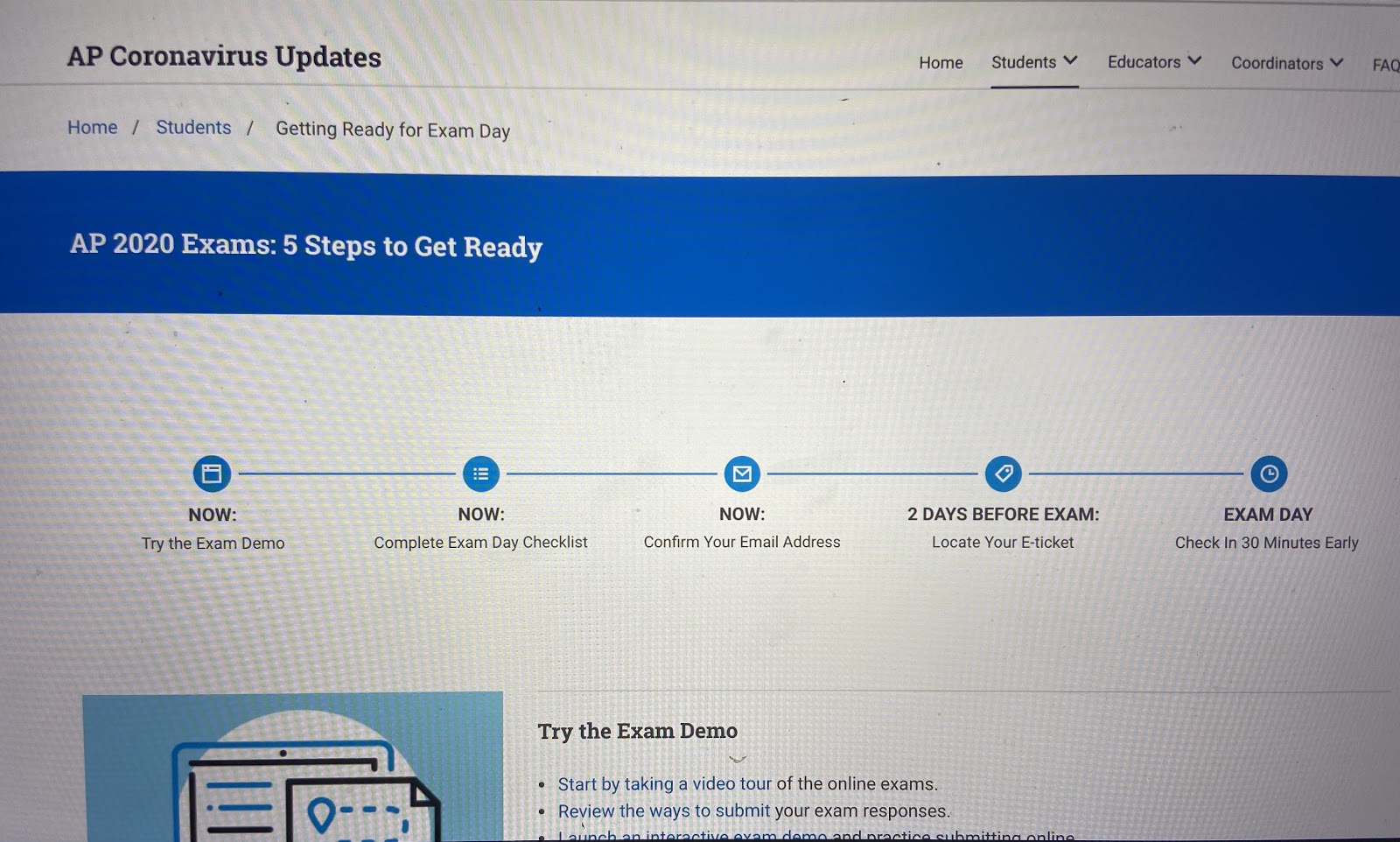AP exams are just around the corner, but this year’s exams are a little different from years past due to the coronavirus. This year, all exams are going to take place online, with guidelines that allow them all as open-book and open-note tests. For some of the subjects, the amount of knowledge/units needed to complete each test was limited to accomodate for the lack of teaching after schools were shut down.
All of the tests will also be short-answer and 45 minutes long. You will need to either write your answers on a piece of paper and take a picture of it to upload to the testing site, use an outside text program (like Microsoft Word or Google Docs), or use copy and paste features on your computer.
A demo (AP Demo) of how to upload your work onto the online testing platform that came out on May 4 on the college board website. For each way to upload, there are different requirements and accepted file formats. These can be found on the live demo. The college board has explicitly stated that the exams are not compatible with Internet Explorer, but are available on Google Chrome, Firefox, Safari, and Edge.
The college board has posted review videos for each AP exam subject online for practice. These can be found on their website as well under the coronavirus updates links (Coronavirus Updates). These videos are a great way to review for your specific AP exam and cover things like how to write a DBQ for your social studies classes, a world language essay, or how to do free response questions in science and math classes.
This is the schedule for these helpful review videos (they are live at these Eastern times every work day from the college board website but can be accessed after the fact from youtube or the website):
9-9:45 AM-Calculus BC
10-10:45 AM-Chemistry & Music Theory
11-11:45 AM-U.S. History & European History
12-12:45 PM-English Literature and Composition & Physics
1-1:45 PM-Environmental Science
2-2:45 PM-Statistics, Spanish Literature, & Calculus AB
3-3:45 PM-Spanish Language and Culture, Microeconomics, Government, & English Language
4-4:45 PM-Biology, Psychology, Japanese, & Computer Science A
5-5:45 PM-Chinese, Macroeconomics, & Human Geography
6-6:45 PM-World History, French, & Latin
A lot of teachers are also hosting online review sessions, usually posted through Remind or through Google Classroom. Another good resource to use to study for these exams is Khan Academy, a free learning space for students. They have a variety of classes to choose from and study for, and a tip that helps is to take the final test for the class on Khan Academy, and after you finish it, they will tell you what units you need more help with, which narrows down your study time and focus.
The College Board has also released some older exam questions for extra practice for each of the subjects that are posted under coronavirus updates on their website.
Also, since the exams are open-book and open-note, it is important to have your notes organized since 45 minutes is not a lot of time to flip through them all. I would recommend having a two-monitor setup if possible (one to look at the prompt if it is for Literature or History) and one to write your essay on to avoid tab flipping.
Make sure you have a lot of paper prepared if you plan on writing your responses and download an app called cam scanner to make it easier to take a picture of your response and convert it to an acceptable file format.
Reach out to your teachers and ask if they have any recommended study guides or summary sheets to keep by you during your exam if you need a quick reference to anything. I would suggest against google searches during the exam since the college board is placing high security measures to ensure no cheating is taking place. So if you have online notes, I would have them pulled up in a seperate tab before your exam starts.
Make sure you are keeping in contact with the College Board over email. That is where they will send you the exam ticket letting you into the test itself. Email your teachers with any concerns and questions about the exams.
The College Board has assured students it wouldn’t be any harder to earn a 3-5 on the exam than in years past. Students should expect to earn their grades mid-July (which is the typical time they come in), but the different thing about them this year is that the teachers not only receive everyone’s responses back but can also refute with the graders if one of their students did not earn a 3 or above (Exam Scoring and Earning Credits). They can defend the student and argue for them to get at least a 3. This is why it is so important to keep doing your work and studies in your teacher’s classes.
Keep studying for the AP exams by reviewing your notes, Khan Academy, your teacher’s videos, using the college board, or another platform. You may not think you need to study since all tests are open book/ open note, but time flies by. Especially when you only have 45 minutes of it, so it is important to know where your notes are located or remember them if possible to have as much time as you can to complete your responses.

Hi! My name is Abigail and I am a senior editor for The Mycenaean. I am also a member of Leesville’s cross country team and track team, as well as the president of National Technical Honor Society.

Leave a Reply